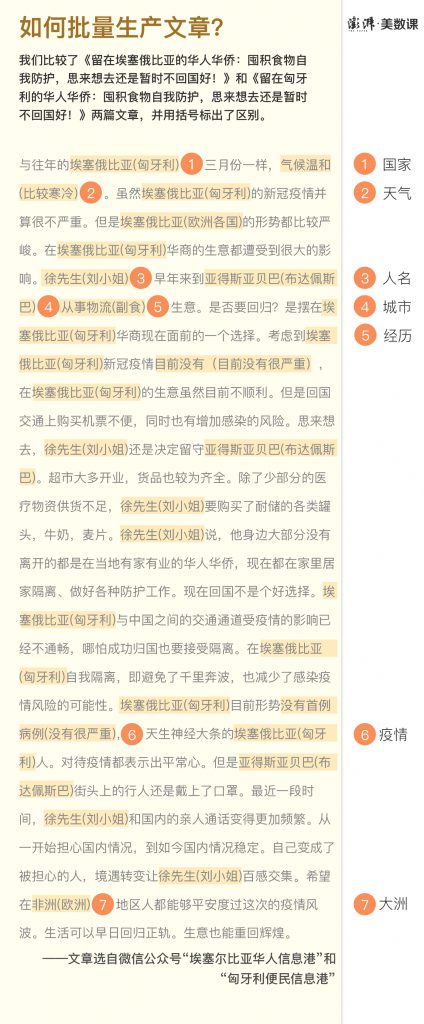To portray itself as the world leader in fighting the novel coronavirus, the Chinese Communist Party (CCP) has painted a rosy picture that China has won the battle with the coronavirus while other countries are in deep trouble. However, this propaganda campaign backfired. Many Chinese overseas have been lured to return to China and the CCP quarantined them in the fear of infection. The CCP then started to tell the overseas Chinese not to come back.
The CCP also took on the “content farms” that spread rumors that other countries were in trouble. These farms were following the CCP’s propaganda strategy, but their “excellent achievements” contributed to the backfire.
The Paper, a newspaper in Beijing, compared some of the articles from these content farms and found they were amazingly similar in both the title and the contents throughout the article.
It gave the comparison result of two articles, one about Chinese in Ethiopia and one about Chinese in Hungry. The two articles had almost exactly the same contents, with the only exception being the swapping out of the country name, capital city, and a pseudo person (Mr. Xu vs. Ms. Liu).
It pointed out that that these articles were pushed onto many Chinese Communist websites in different countries. Three companies, all under a person named Guo Hong in Fujian Province owned those websites.
Radio Free Asia reported that Fujian police investigated Guo Hong’s husband Xue Yumin, the actual man who ran the operations in those companies, along with other fake media owners who supported the CCP’s propaganda campaign, under the charge of “fabricating fake information that led many Chinese overseas to return to China and jeopardize China’s epidemic control.”
A senior media practitioner Mr. Liu pointed out that the CCP has a long history of brainwashing overseas Chinese. Though they stay outside of China, they still rely on China’s state machine and Chinese media to obtain information. And thus, content farms have found it easy to cheat them at this time.
Related postings on Chinascope:
- Propaganda and Lies: Mainland Chinese Calling the Returning Chinese “Flying Thousands of Miles to Poison Chinese”
- Propaganda and Lies: Overseas Chinese Fell for the Propaganda That China’s Epidemic Was Over
- Propaganda and Lies: The Truth about the Video “An American Spread Virus in Wuhan Subway”
- Propaganda and Lies: Italian Media Called out CCP for Spreading Fake News
- Propaganda and Lies: Chinese Bots Flooded Twitter to Spread That U.S. Is the Origin of the Coronavirus
Screenshot of The Paper’s comparison of two articles:

1. Excerpt in Chinese:
《疫情之下的阿尔及利亚:店铺关门歇业,有家难回,在阿尔及利亚待着太难了!!》、《疫情之下的印尼:店铺关门歇业,有家难回,在印尼待着太难了!!》……大家发现这些文章不仅标题非常相似,正文也是重合度相当高。澎湃新闻(www.thepaper.cn)记者发现,这样的文章不止一篇。实际上,在疫情期间,涌现了不少批量发布的文章。
我们选取了发布在“埃塞尔比亚华人信息港”公众号上的《留在埃塞俄比亚的华人华侨:囤积食物自我防护,思来想去还是暂时不回国好!》和发布在“匈牙利便民信息港”公众号上的《留在匈牙利的华人华侨:囤积食物自我防护,思来想去还是暂时不回国好!》上的两篇文章进行比较,并用括号标出了区别。
从上述两篇文章的比较中可以发现,批量生产疫情文章的要点是修改地理信息、人物经历。包括大洲、国家、城市在内的地理信息是最基本的修改点,天气是依据地理信息衍生修改;人物经历的处理则草率得多,仅仅修改姓氏、性别和行业,不论是现居埃塞俄比亚的徐先生还是现居匈牙利的刘小姐,因为疫情生意都不顺利,思来想去后都决定留守,都购买了耐储的罐头、牛奶和麦片。
虽然这些文章都来自不同的公众号,从宣传自己服务于非洲华人的“掌上埃及”、“坦桑尼亚华人信息港”等号,到定位欧美的“比利时华人信息港”、“掌上都柏林”等等,但点进去就会看到它们的账号主体主要就是3家公司:福清天天快帮网络科技有限公司、福清时代创想传媒有限公司和福清市海外同城人人帮网络科技有限公司。而这3家公司的股权架构上,都有着同一个人的身影。
Source: The Paper, March 18, 2020
https://m.thepaper.cn/yidian_promDetail.jsp?contid=6565639&from=yidia
2. Excerpt in Chinese:
福清的自媒體老闆郭紅承認炮製一系列關於「世界疫情」的網文後,海外不少「小粉紅」信以為真,紛紛計劃跑回中國。本台記者從多個渠道獲悉,郭紅的丈夫、同時也是該自媒體的實際運營人薛育民等人,目前正接受福建公安調查,罪名是「編造虛假資訊導致大批華人回國危及防疫」。
有資深傳媒人指,今次中共罕有對這些「大外宣承包戶」下手的原因是,「紅色自媒體」闖出大禍。「紅色媒體」炮製了各種謊言,例如世界各國疫情失控,獨中國安全等。這類謠言經廣泛傳播,海外不少「小粉紅」信以為真,紛紛計劃跑回中國,導致中國的新冠疫情輸入病例激增;中共實行全民長達一個多月的殘酷封禁,才換來近期的疫情緩解;如果大批「小粉紅」突然從外地回國,疫情隨時有再次惡化的可能。
資深媒體人劉先生指,涉事的媒體平台懷疑與當局的「大外宣」方針有關。他指,很多海外華人多年來被中共洗腦,移民國外後依然依賴中國官方消息和中文自媒體獲取資訊,導致郭紅的家族自媒體內容被很多人相信以及轉發,而大量聽信了這些宣傳的華人紛紛回國避疫,結果導致北京方面再次面臨輸入性疫情的壓力。隨著國內出現第二波疫情爆發,充當大外宣的「自乾五」(全稱「自帶乾糧的五毛」)被拋棄理所當然。
Source: Radio Free Asia, March 19, 2020
https://www.rfa.org/cantonese/news/lie-03192020083325.html
